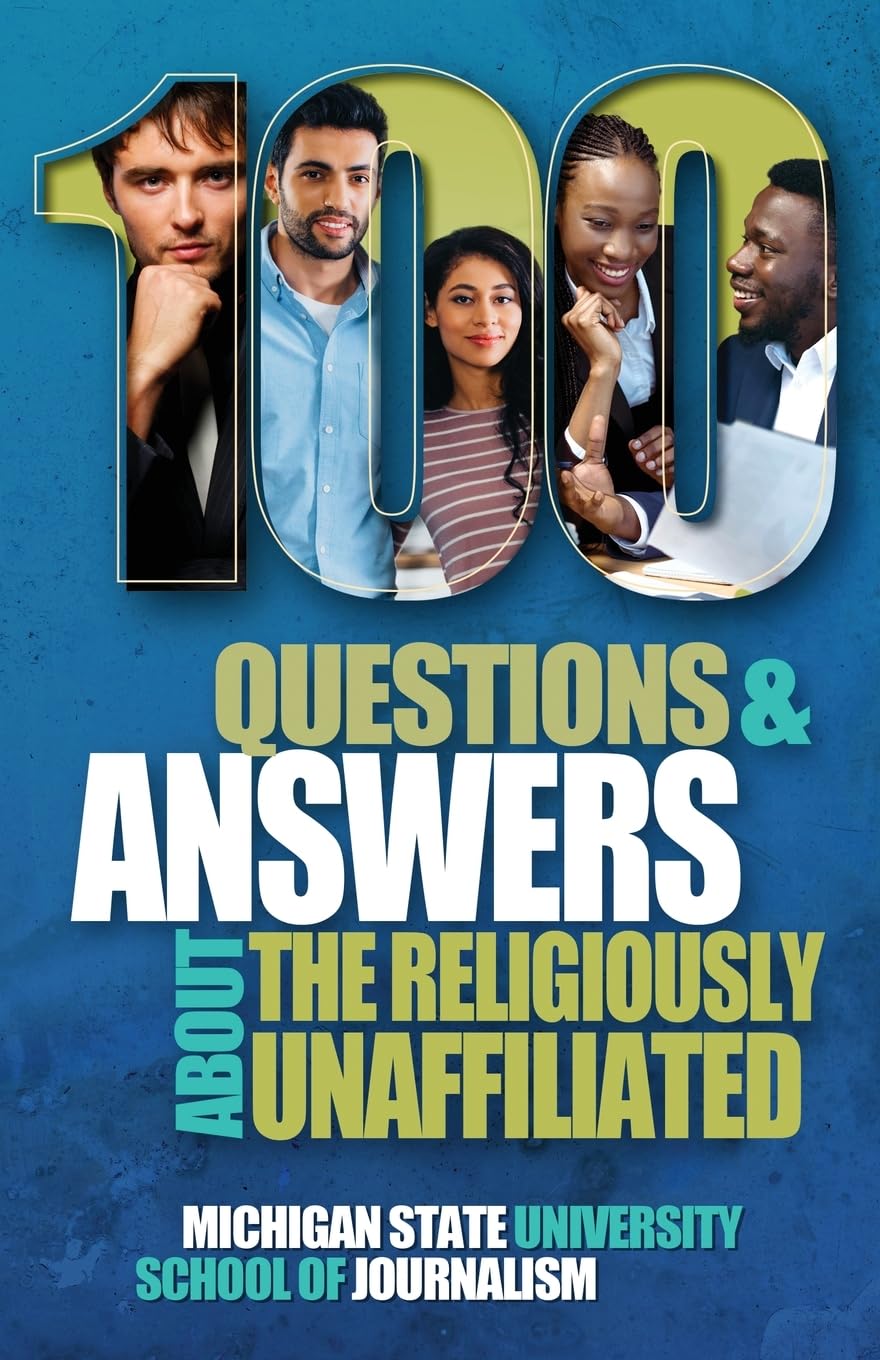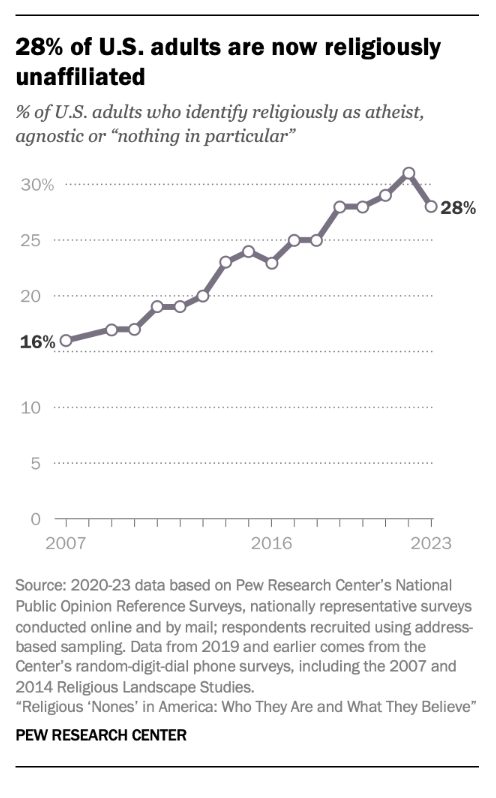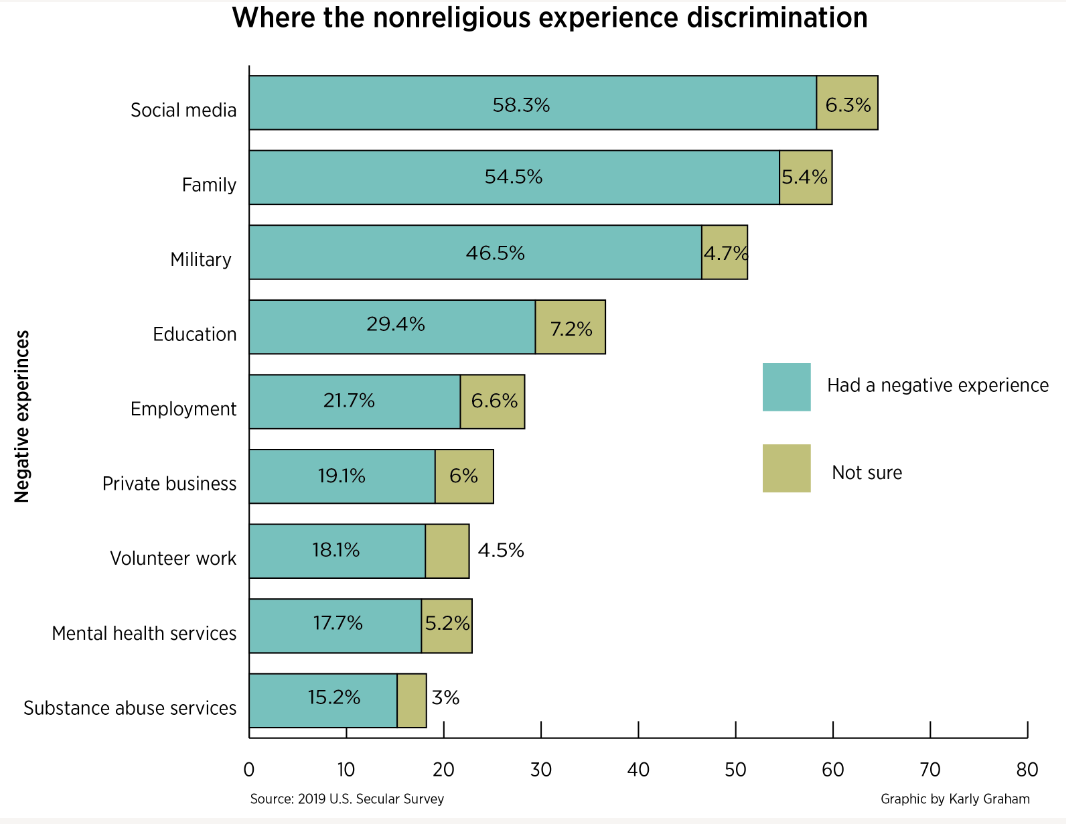The ‘Religiously Unaffiliated’ are far more diverse than the label ‘None’ suggests

Click the cover to visit the book’s Amazon page. Copies will arrive shortly after the March 5 publication date.
MARCH 2024 UPDATE: This new Bias Busters book now is shipping from Amazon!
By JOE GRIMM
Director of MSU Journalism’s Bias Busters project
So-called religious “nones” are clearly more than nothing.
The number of people in the United States who do not publicly identify with an organized religion is driving headlines again. Researchers and journalists sometimes reduce them to the one-word label “nones”—referring to their choice of the “none of the above” option in surveys about religious affiliation. But the truth is: The unaffiliated are a vast and diverse group.
First, the sheer size of this group of people who prefer not to label their spiritual-religious lives in traditional ways is fascinating to researchers, authors, journalists—and, of course, community and religious leaders nationwide.
We keep asking: Who are all these people?!
We wonder: How do these people see the deeper or more transcendent aspects of their lives, their communities and the cosmos without adopting our long-standing labels for religious membership?
And, what exactly do they believe?
One major milestone in American life that is easy to miss in many of the press reports about the unaffiliated is this: Rather than a shrinking of America’s religious diversity, this huge group of people who reject our most common religious labels seems to represent an expansion of America’s spiritual diversity.
In fact, we are realizing that those traditional survey check-lists of “religious affiliation” don’t tell us much about the religious-spiritual lives of a huge portion of our population. The old way of gathering and reporting this data doesn’t seem to be working very well.
That’s why our Michigan State University School of Journalism team of award-winning student journalists—who we call the Bias Busters—decided to step in and report on information that seems to be missing from the many headlines about “nones” in 2024. Especially if you are an educator, community leader, health-care provider, policy maker, media professional—or anyone else who needs to understand the makeup of our communities—you should pre-order a copy of Michigan State University’s latest Bias Busters book today.
What Do We Mean About Adding to America’s Religious Diversity?
The landmark January 2024 Pew Research report raises more questions than it answers about the hard-to-define spiritual-religious nature of these Americans.
Just a few excerpts from Pew’s report:
- Most “nones” believe in God or another higher power.
- But very few go to religious services regularly.
- They are not uniformly anti-religious. … Most say religion causes a variety of problems in society—like intolerance or superstition. But many “nones” also say that religion helps give people meaning and purpose, and that it can encourage people to treat each other well.
- They are far less likely than religiously affiliated Americans to say they believe in God “as described in the Bible,” but most do believe in God or some other higher power. Just 29% reject the notion that there is any higher power or spiritual force in the universe.
- About half say spirituality is very important in their lives or say they think of themselves as spiritual.
And here’s one more fact to puzzle over: We know that many regular readers of our ReadTheSpirit online magazine are religiously unaffiliated—because we have heard from so many of you via emails, calls, zooms and in-person conversations over the past 17 years. In fact, we know that our publishing house serves people from at least a dozen traditional religious groups—from Christians, Jews and Muslims to Buddhists and Native Americans—but we also count “nones” among the major supporters of our publishing projects.
That’s true of the team behind ReadTheSpirit—and that’s true of the diverse student body behind our MSU Bias Busters project over the past decade. Some students proudly describe their religious affiliations; some students are—unaffiliated.
And, here’s why that’s so important: Over many years, we have figured out ways to work together for the common good.
Now, do you have more questions about how this undefined “group” plays a role in our incredibly diverse religious-spiritual landscape?
Well, just to make it easy: Here’s that link again to the new book’s Amazon page. Pre-order your copy today and it will arrive just after March 5.
This Isn’t the First Time the Unaffiliated Have Made Headlines
Today, we are experiencing an echo of earlier nationwide interest in this group. You can follow the waves by looking at the trend line in estimates of the group’s size.
In January, James Emery White explained, “When I wrote The Rise of the Nones: Understanding and Reaching the Religiously Unaffiliated in 2014, it was in many ways a warning of a coming cultural tsunami. I was having to make the case that there actually was a rise in this particular religious demographic—and that it was going to matter.”
White added: “Ten years later, the wave of the nones has clearly crashed upon our spiritual shores.”
White, a prolific author who has described himself as a sometimes none, is a former professor of theology and the founding and senior pastor of Mecklenburg Community Church in Charlotte, North Carolina.
He wrote that book 10 years ago after Pew’s researchers noted an especially steep upward curve in the share of people who said they were religiously unaffiliated. A Pew team wrote in 2012, “In the last five years alone, the unaffiliated have increased from just over 15% to just under 20% of all U.S. adults.”
This set off a cottage industry of writing, posting and publishing about the phenomenon.
The number continued rising. This make-shift “group” identified by pollsters hit 30%, eclipsing “evangelical Christians” and “Catholics”. People speculated answers and tracked down motives. Other research indicated that maybe the rising number just meant people were coming out of the closet about their non-affiliation.
A Diverse Group That’s Challenging to Chart
 After a while, public discussion of this group quieted and, in recent years, many scholars who study religion at universities and research centers nationwide have focused more on the rising tide of politically conservative Christians, the rise of the so-called “Christian Nationalists.” ReadTheSpirit reported on that trend in October.
After a while, public discussion of this group quieted and, in recent years, many scholars who study religion at universities and research centers nationwide have focused more on the rising tide of politically conservative Christians, the rise of the so-called “Christian Nationalists.” ReadTheSpirit reported on that trend in October.
Then, Pew gathered new data on the unaffiliated—and one particular finding suddenly leapt into the national conversation in early 2024: Perhaps the total number of religiously unaffiliated folks is stabilizing—or even shrinking.
In January 2024, Pew reported, “28% of U.S. adults are religiously unaffiliated … That’s marginally lower than our surveys indicated in 2022 and 2021, and identical to what we found in 2020 and 2019 …”
Pew concluded that sentence by saying this “raises a question: After decades of sharp growth, has the rise of these religious ‘nones’ ended?”
Pew’s answer? “At the risk of sounding wishy-washy, we think it’s too early to tell.”
“Too early to tell” does not deter people from writing, speaking, preaching and strategizing about this enormous group of Americans once again. On The Late Show one evening, Stephen Colbert cracked a few jokes about how difficult it is to identify this group.
Even James Emery White isn’t quite sure what to make of this new data. This is how he concluded his January post about the nones: “They are not rising … they have risen.”
The Fact Is: Nones Are All Around Us
In fact, you may be a “none” yourself—although, one thing we have learned about these Americans is that the vast majority don’t like to be called “nones.” So, excuse us in occasionally dropping that word into this week’s ReadTheSpirit cover story, simply as a matter of clarity.
And, the fact is: It doesn’t really matter whether the trend line is going north or south. Whether 28% of the nation is religiously unaffiliated or the proportion is 30%—it is always a good time for people to understand each other better.
That is what this newest MSU Bias Busters guide is all about. In researching this guide, our students fanned out to ask unaffiliated people what they wish others knew about them. Some were deeply unhappy about being called “nones.” That label implies they are nothing, empty, zeroes. Many are deeply spiritual and moral. Many say they have a relationship with God—their problem is with churches or clerics.
Some believe in God. Some, included in this same group, say they do not believe in God at all. Some aren’t sure. Some are open to the idea but want proof.
And, missing from a lot of the reporting on this huge group is the fact that millions of these folks have found new labels they prefer, instead of the list survey researchers give them. What are some of those labels? The subtitle on this guide is “Nones, Agnostics, Atheists, Humanists, Freethinkers, Secularists and Skeptics.”
The 100 questions cover the wide range of Americans who wind up in the “unaffiliated” group. The answers might surprise you.
We already have listed some of the findings above. But here are a few more that are likely to surprise readers:
• Most nonreligious people believe in heaven.
• Unaffiliated people score higher on religious knowledge tests than most others.
• They have a strong belief in religious freedom because they want the right to be free from religion.
• Many pray and enjoy other spiritual practices.
• Pew reports that 87% of the religiously unaffiliated celebrate Christmas.
So, help us contribute to healthy communities
 That’s our goal. “Good media builds healthy community” is the motto of the publishing house behind ReadTheSpirit and behind the entire Bias Busters series of books.
That’s our goal. “Good media builds healthy community” is the motto of the publishing house behind ReadTheSpirit and behind the entire Bias Busters series of books.
We can share that motto because it represents the best principles in American journalism.
The students who have contributed to the Bias Busters project know they are helping real people—family, friends and coworkers—to be more clearly understood in our diverse communities. And, with this particular minority group, we recognized that we’ve all got work to do. We found that religiously unaffiliated people report they are frequently judged, put down or misled by even well-intentioned people who want to save them. Sometimes the slights are accidental; sometimes not.
This new guide—like all of the guides we have published to date—shows how to engage with people in a respectful, mutually beneficial way to encourage healthy community life.
Just think about that for a moment: Healthy community.
Pew didn’t ask about that particular group—but I’ll bet nearly 100 percent of us would like to affiliate with that.
So, one last time: Preorder your own copy of this unique and timely new book right now.
